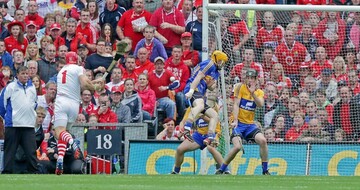THE NEW HURLING and football rules approved by GAA Congress earlier this year will come into effect for the first time this weekend.
The changes include the introduction of one-on-one penalties in hurling as well as an advantage rule.
There is also a new rule governing 20-metre frees in hurling with a maximum of five defenders now permitted on the goalline.
The rules were passed by Congress in February and apply to all games played on or after 11 April, meaning they will be in force for the semi-finals and finals of the National Football and Hurling Leagues.
Advertisement
Rules changes (via GAA.ie)
Hurling:
- A yellow card does not carry into extra-time.
- Referee may consult with a neutral linesman concerning the validity of a score.
- Penalty – One defending player on the goal-line who may not move towards the 20m line until the ball has actually been struck. The player taking the penalty may place it up to 7m back from the 20m line and within the arc but must strike the ball on or outside the 20m line.
- For free pucks for technical fouls committed inside the large rectangle and awarded on the centre point of the 20m line, a maximum of five players may stand on the goal-line and may not move forward until the ball has been struck. The player taking the free puck may place the ball up to 7m back from the 20m line and within the arc but must strike it on or outside the 20m line.
- For a 20m free puck awarded for a foul committed outside the large rectangle, all players shall stand a minimum of 20m from the point of award of the free and may not move closer to that point until the ball has been struck.
- Rule 2.4 and 4.16 – If a defending player(s) fouls before the ball is struck and a goal does not result, the referee shall give the penalty taker/free taker the option of re-taking the penalty puck/free puck or of having a point scored to stand.
- If a player taking a penalty puck or other free puck awarded on the 20m line fails to lift the ball at the first attempt or fails to strike it with the hurley, even if the action causes it to marginally cross the 20m line, he shall be allowed to strike the ball on the ground without delay.
- Advantage – Referee may allow the play to continue for up to 5 seconds after a foul; if no advantage accrues during that 5 seconds he may subsequently award a free puck for the foul. (This is the same rule that has been in place in football for the past year; no advantage accruing would include such instances of a pass going astray, another player moving in to tackle as soon as the fouled player gets away from the initial foul, a shot taken within the five seconds which goes wide, a shot taken within the 5 seconds which is saved by the goalkeeper etc; in these instances the referee should come back and award the original free. If a player/team who had been awarded an advantage commits a foul within the 5 second period then the free shall be awarded against him for the subsequent foul)
Football:
- A yellow card does not carry into extra-time.
- Referee may consult with a neutral linesman concerning the validity of a score.
- Rule 2.3 and 4.16 – If a defending player(s) fouls at a penalty kick situation before the ball is kicked and a goal does not result, the referee shall give the penalty taker the option of re-taking the penalty kick or of having a point scored to stand.









Excellent tv show, shame it’s on it’s last season.
Yo Yo Yo Mr. White !!! Bitch !
Liam,
Apparently a 6th series is being discussed, after they air series 5 (part2).
Happy Christmas :)
Really? Series 6? You’re not yanking my chain?…. Do ya hear that Mr. White? We can still coook!! Sweeeeet
im not entering in case i win that horrible manu dvd
Bryan Cranston is the best actor around and Walter White is the best character on television.
That is Emile Heskey if I am not mistaken.
Cant be, Heskey doesn’t wear glasses
Jesus Paddy, seems Heskey does wear glasses.
The thumbs have spoken…
Bryan cranston from malcom in the middle
U just ruined christmas!!!
buzzwrecker..
He played a good part in ARGO, he is moving up in the movie world, strange to make it big at his age, not an overnight success, but always enjoyable.
Defo Bryan Cranston from Malcolm in the Middle !!!!
Next season is the last season of Breaking Bad!
well holy god, who’d have thought he was giovanni’s love child!!